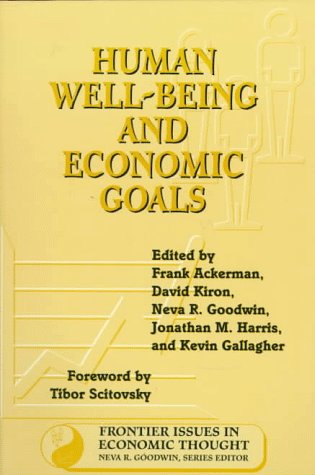Frontier Issues in Economic Thought
2 total works
Human impacts on the environment are largely driven by economic forces. If a more ecologically sustainable world is to be achieved, significant changes must be made to the current growth- and consumption-dependent economic system. The "Frontier Issues in Economic Thought" series was designed to assist the growing number of economists and others who are responding to the need for new thinking about economics in the face of environmental and social forces that are reshaping the world. This volume examines the causes and effects of the rapid transformation of the world of work. It provides concise summaries of the key writings on work and workplace issues, extending the frontiers of labour economics to include the often overlooked social and psychological dimensions of work. The book begins with a foreword by former US Secretary of Labour Robert Reich that presents labour in contemporary perspective. An introductory overview provides a brief history of the changing nature of work and situates current problems in the context of longer-term developments.
Following that are eight topical sections that feature three- to five-page summaries for each of the ten to twelve most important articles or book chapters on a subject. Sections cover: new directions in labour economics; social and psychological dimensions of work and unemployment; globalization and labour; new technologies and organizational change; flexibility and internal labour markets; new patterns of industrial relations; family, gender, paid and unpaid work; and difference and diversity in the workplace. The book offers a roadmap for scholars on the vast and diverse literature concerning labour issues, and affords students a quick overview of that rapidly changing field.
Following that are eight topical sections that feature three- to five-page summaries for each of the ten to twelve most important articles or book chapters on a subject. Sections cover: new directions in labour economics; social and psychological dimensions of work and unemployment; globalization and labour; new technologies and organizational change; flexibility and internal labour markets; new patterns of industrial relations; family, gender, paid and unpaid work; and difference and diversity in the workplace. The book offers a roadmap for scholars on the vast and diverse literature concerning labour issues, and affords students a quick overview of that rapidly changing field.
Human Wellbeing and Economic Goals
by Frank Ackerman, David Kiron, and Et Al
Published 1 November 1997
What are the ends of economic activity? According to neoclassical theory, efficient interaction of the profit-maximizing "ideal-producer" and the utility-maximizing "ideal consumer" will eventually lead to some sort of social optimum. But is that social optimum the same as human well-being? This volume addresses that issue, considering such questions as: does the maximization of individual welfare really lead to social welfare?; how can we deal with questions of relative welfare?; and how can these things be measured, or even assessed? The book brings together more than 75 concise summaries of literature in the field that consider issues of present and future individual and social welfare, national development, consumption and equity. Like its predecessors in the "Frontier Issues in Economic Thought" series, it takes a multidisciplinary approach to economic concerns, examining their sociological, philosophical and psychological aspects and implications as well as their economic underpinnings. It offers an introduction to the current and historical writings that examine the concept of human well-being in ways that can help us to set goals for economic activity and judge its success.

